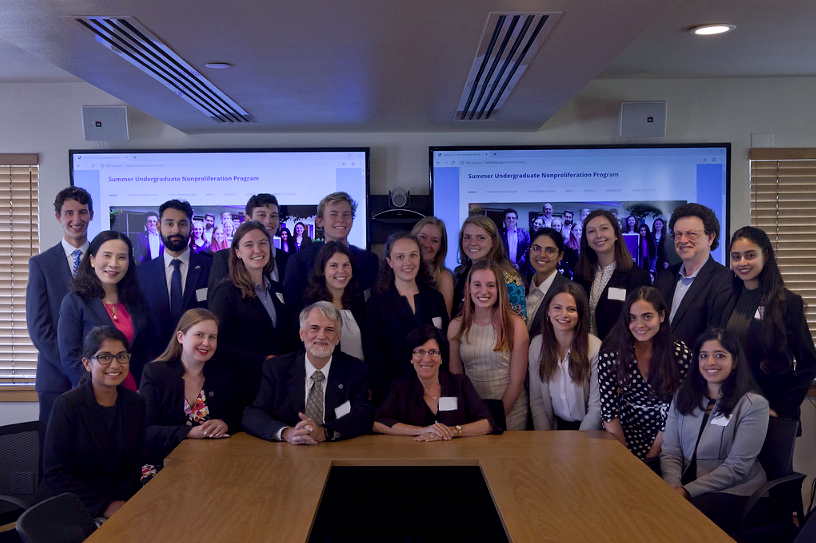July 17, 2019
Masako Toki
During the summer of 2019, the James Martin Center for Nonproliferation Studies (CNS) at the Middlebury Institute of International Studies at Monterey (MIIS) is hosting 17 outstanding undergraduate nonproliferation fellows. One of the highlights of the undergraduate fellowship program is the fellows’ research presentations at a luncheon event with major supporters for CNS—Sarah and Tom Pattison, CNS experts, and several MIIS faculty members.
Sarah and Tom Pattison have been long-time supporters and friends of CNS and MIIS since 2007. They are major supporters of CNS nonproliferation education projects for young generations including the Summer Undergraduate Nonproliferation Fellowship Program and the Critical Issues Forum Project.
CNS has been so grateful to have such dedicated friends who value and understand the importance of nonproliferation and disarmament education for young generations in order to make progress toward the goal of peace and security in a world free of nuclear weapons. This year, Tom and Sarah visited CNS to meet with the summer fellows on July 12.
With a personal commitment to nonproliferation and a more secure and peaceful world, Tom and Sarah established the Tom and Sarah Pattison Fund a decade ago in support of the CNS mission. Their generosity bolsters CNS activities related to efforts to achieve a WMD-free zone in the Middle East as well as the training of young scholars and fellows in the nonproliferation field. In this way, CNS’s unique summer undergraduate nonproliferation fellowship program aligns with the purpose of the Fund.
Presentations
At the luncheon, 17 top-level undergraduate interns introduced the highlights of their individual research projects. This year’s group is a diverse set of undergraduate students from a variety of backgrounds and specializations.
The fellows were divided into five groups according to their research interests and each group’s work contains a common theme:
- Treaties and Organizations: International Engagement
- General Nonproliferation Security Threats
- Regional Issues: Middle East and South Asia
- Modern Nuclear and Radiological Threats
- Tackling Nonproliferation with New Technology
Projects involved high-quality research methodologies and innovative studies, resulting in original perspectives and engaging presentations.
For example, one of the groups presented three sets of research projects: The role of third-party mitigation in de-escalating crises between nuclear-armed India and Pakistan; nuclear democracy command-and-control structures with comparative analysis with an emphasis on Israel’s nuclear program; and the Yemeni civil war, highlighting an ethical analysis of the export-control regime. Another group introduced their research projects on tackling nonproliferation with new technologies, including, for instance, CNS’s satellite imagery project, Geo4nonpro’s Berm Finding Campaign, exploring implications for machine-learning algorithms and feasibility of thermal imaging for remote-sensing open-source nonproliferation analysis. Another fellow of this group analyzed environmental injustices and population exposure around past nuclear-test sites including Semipalatinsk in Kazakhstan, the Marshall Islands, and Reggane in Algeria using geographic information systems (GIS). The last presenter of this group introduced a geospatial and analytic effectiveness study of ballistic missile-defense systems.
Since the fellowship program is still halfway through and each research project is ongoing, rather than presenting their final findings, fellows presented their interim findings, next steps, and research questions. In response to each presentation, CNS experts gave comments and advice to the presenters so that they can improve their research projects by the end of the fellowship program.
View a slide show of the presentations.
The luncheon was a mutually enjoyable event for both Mr. and Mrs. Pattison, the undergraduate fellows, and all of the other participants with lively and thoughtful discussions.
A New Podcast
In addition to their research presentations, Summer Undergraduate Fellows also introduced their newly launched podcast, “Big Nuke Energy: Young Women Working in Nonproliferation,” as well as a very amusing way to introduce each intern in a short video clip.
Audience members were very impressed by the undergraduate fellows’ high-quality research projects, innovative thinking, and analytical skills. In his final comments, CNS Director Dr. William Potter shared his conviction in the importance of nonproliferation education for the next generation to combat proliferation of weapons of mass destruction.
Special Thanks
All of the summer fellows were selected through a rigorous and competitive application process. The summer undergraduate fellowship in nonproliferation studies offers college students a rare opportunity to engage in research on nonproliferation issues. This initiative helps fulfill the CNS mission to train the next generation of nonproliferation specialists, a mission which has been consistently supported by the Tom and Sarah Pattison Fund.
CNS is also grateful for the Early Family Fund for International Education and the Carnegie Corporation of New York for their generous support for the undergraduate fellowship program.


